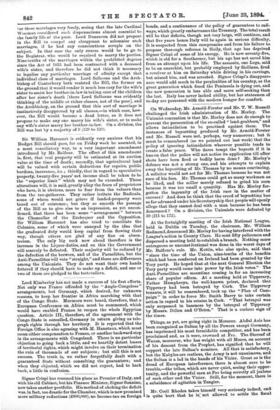Sir William Harcourt is evidently very anxious that his Budget
Bill should pass, for on Friday week he assented, in a most conciliatory way, to a very important amendment introduced by Mr. Balfour. The effect of this amendment is, first, that real property will be estimated at its auction value at the time of death ; secondly, that agricultural land will be valued with certain deductions for repairs, public burdens, insurance, &c.; thirdly, that in regard to speculative property, twenty-five years' net income shall be taken to be the "superior limit" which may not be exceeded. These alterations will, it is said, greatly allay the fears of proprietors who have, it is obvious, more to fear from the valuers than from the tax-gatherers. They rather irritate the Radicals, some of whom would not grieve if landed-property were taxed out of existence; but they so smooth the passage of the Bill as to give rise to an impression, as yet uncon- firmed, that there has been • some " arrangement " between the Chancellor of the Exchequer and the Opposition. Sir William Harcourt has also tried to• conciliate the Colonies, some of which were annoyed by the idea that the graduated duty would keep capital from flowing their way, though others are glad of any fine on absen- teeism. The only big rock now ahead therefore is the increase in the Liquor-duties, and on this the Government will scarcely be defeated. Their majority will be reduced by the defection of the brewers, and of the Parnellites, but the Anti-Parnellites will vote "straight," and there are differences among the Unionists. They do not want their own hands fettered if they should have to make up a deficit, and one or two of them are pledged to the teetotallers.


































 Previous page
Previous page